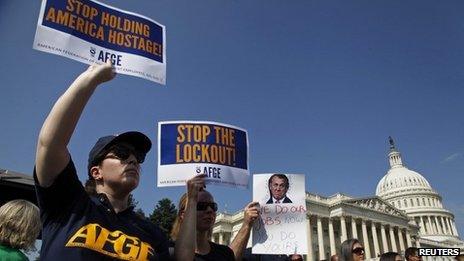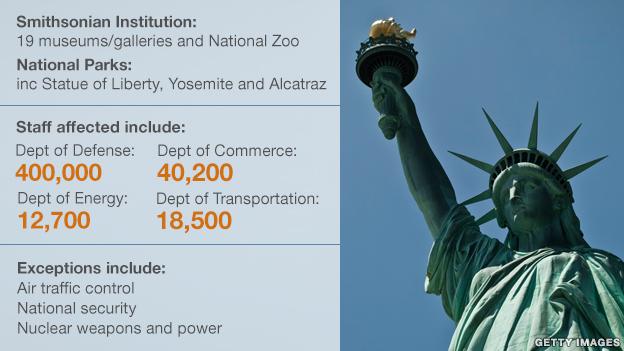US shutdown: Kerry warns on foreign policy impact
- Published

Federal workers have been protesting to demand and end to the shutdown
US Secretary of State John Kerry has warned that any prolonged shutdown of the government could affect the US internationally.
But, speaking at the Apec forum in Indonesia, he said any impact was "momentary" and Washington's commitment to Asia was "undiminished".
President Barack Obama cancelled his Asia visit because of the shutdown.
The US government closed non-essential operations on Tuesday after Congress failed to agree a new budget.
Hundreds of thousands of federal employees have been sent home, and the House of Representatives voted unanimously to pay them retroactively once the shutdown ends.
In a weekly address President Obama said he was not prepared to "pay a ransom in exchange for reopening the government" and that the far right of the Republican party was preventing a Yes-or-No vote.
John Kerry said the partial shutdown of the US government was "an example of the robustness of our democracy"
"Take that vote. Stop this farce. End this shutdown now," he said.
Republicans, who control the House, have tied passage of the budget to Mr Obama's healthcare reform, which they are seeking to weaken or delay. They have accused Democrats of refusing to negotiate.
"Republicans are eager to end the shutdown and move ahead with the fiscal and economic reforms that our country so urgently needs," said Senator John Cornyn.
"But we're never going to make real progress without greater co-operation from our friends across the aisle."
Democrats note that the healthcare law was passed in 2010, subsequently approved by the Supreme Court, and was a central issue in the 2012 election which Mr Obama won comfortably.
'Robust democracy'
As world leaders headed for the Asia-Pacific Economic Co-operation (Apec) summit in Bali, Mr Kerry sought to allay concerns that Washington was reducing its global engagement.
"None of what is happening in Washington diminishes one iota our commitment to our partners in Asia," he said.
He said the dispute with the Republicans in the US Congress was "an example of the robustness of our democracy".
But at the same time, he urged Congress to think about how the US was perceived internationally when "we can't get our own act together".
Mr Kerry said areas where the shutdown was affecting US foreign policy funding included:
delays in security assistance for Israel
nearly all staff suspended at the treasury department's Office of Foreign Asset Control, which monitors sanctions on states like Iran
The Secretary of State warned of the consequences if the shutdown became longer term.
"This is a momentary impact. Obviously if it were prolonged or repeated people would begin, I think, to question the willingness of the United States to stay the course or its ability to, but that's not the case and that will not be the case."
Mr Obama had been due to begin a four-nation Asian trip on Saturday, heading to Bali and Brunei before travelling on to Malaysia and the Philippines.
He used the APEC summit two years ago to announce a rebalancing of American naval power towards the Pacific.
The White House said Mr Obama's decision to cancel his Asia trip was made due to the "difficulty in moving forward with foreign travel in the face of a shutdown".
Who is affected?

US-EU trade negotiations have also been postponed.
US officials had been due in Brussels next week to discuss a sweeping free trade pact designed to boost bilateral trade, but US trade representative Michael Froman informed the EU that financial and staffing constraints made it impossible to send a full negotiating team to Brussels.
He stressed that Washington would continue working with the EU on drawing up the deal, but would have to wait until the shutdown was over.
Reacting to the US announcement, European Trade Commissioner Karel De Gucht said the delay was unfortunate.
"But let me underline that it in no way distracts us from our overall aim of achieving an ambitious trade and investment deal," he added.
The US faces running out of money and defaulting on its debt if there is no agreement to raise government borrowing limits later this month.